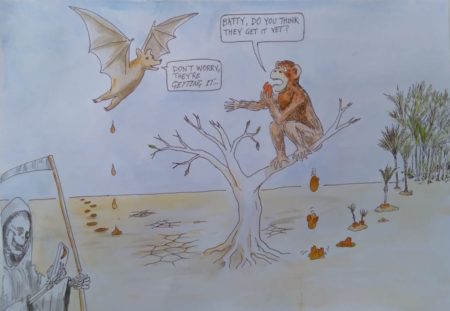Nice Twitter thread from Dr Christian Schöb of ETH Zurich summarizing a whole bunch of results from a crop mixture experiment. Do crops have an in-built disadvantage in mixtures? Something else for breeders to think about?
Brainfood: Cover crops, Forest management, Mixtures, Diverse landscapes, Ethiopia and CC, Mapping settlements, Fonio, Peach, Aging seeds, African diversity, Svalbard, Vegetables
- The hidden land use cost of upscaling cover crops. You’d need to devote 4% of the arable maize area of the US to cover crop seed production to have enough cover crop seed for the maize cultivated area. That’s a lot. The answer: better cover crop genetics and agronomy.
- The first rapid forest inventory and resource use assessment of Dashtijum Nature Reserve, Tajikistan: a mixed methods approach. Fancy maths says you need to restrict grazing in these fancy walnut-fruit forests to prevent further degradation.
- Towards intercrop ideotypes: non-random trait assembly can promote overyielding and stability of species proportion in simulated legume-based mixtures. In silico modelling shows that not all mixtures outyield pure stands, but it’s hard to predict which will.
- Fixing our global agricultural system to prevent the next COVID-19. Beyond the land sparing vs sharing dichotomy, to multifunctional landscapes, supported by policies and markets.
- The role of climate in the trend and variability of Ethiopia’s cereal crop yields. Higher temperatures during 1979–2014 correlated with lower yields in much of the high potential area. So, trouble ahead.
- Precise mapping, spatial structure and classification of all the human settlements on Earth. Because they’re there, that’s why.
- Genetic Resources and Varietal Environment of Grown Fonio Millets in West Africa: Challenges and Perspectives. Lots of work to be done by enterprising breeders.
- Genetic Resources, Breeding Programs in China, and Gene Mining of Peach: A Review. Lots of work has been done by enterprising breeders.
- Patterns of mitochondrial DNA fragmentation in bread wheat (Triticum aestivum L.) seeds under ex situ genebank storage and artificial aging. Possible biomarker for seed viability, but differences between natural and artificial aging.
- Ancient genomes reveal complex patterns of population movement, interaction, and replacement in sub-Saharan Africa. Present day hunter-gatherers represent a contraction of a previously widespread human population, which interacted in complex ways with subsequent waves of pastoralists and farmers.
- The past shall not begin: Frozen seeds, extended presents and the politics of reversibility. So Svalbard apparently represents the politics of reversibility made concrete. Literally.
- The Role of Vegetable Genetic Resources in Nutrition Security and Vegetable Breeding. How about reversing the slide of traditional vegetables, eh? Those enterprising breeders needed again.
Chimps shit in the woods
Our friend Alex Chepstow-Lusty and co-authors have another paper out on the forests of Central Africa in the late Holocene. The import of this latest piece of work is that when the forests bounced back 2000 years ago from the fragmentation caused by climate change 500 years before, they did so at least partly thanks to forest animals. As ever with Alex, poo is involved, on this occasion chimp poo. We can thank it for the spread of oil palm across West Africa, it seems. Chimps and others seed poopers may, alas, not be so helpful for the forest’s recovery from the current, anthropogenically caused climate change.

Brainfood: Food groups, Bumblebees, Wild lettuce, Bambara, Miscanthus, Wild macadamia, Sperm cryo, Fungi, Feed adoption, Bere evaluation, Lactose persistence
- Culinary Cultural Conservation and Cultural Keystone Food Groups: Concepts in Ethnobotany. Immigrants stick with viandas.
- Safeguarding the genetic integrity of native pollinators requires stronger regulations on commercial lines. About half of bumblebee specimens in SW Spain were F1 hybrids or BC1.
- Lactuca dregeana DC. (Asteraceae: Chicorieae) – A South African crop relative under threat from hybridization and climate change. That’s a hell of a disjunction.
- Exploration of Bambara Groundnut (Vigna subterranea (L.) Verdc, an Underutilized Crop, To Aid Global Food Security: Varietal Improvement, Genetic Diversity and Processing. It all starts with lots of data on 420 genebanks accessions at IITA.
- MGDB: A database for evaluating Miscanthus spp. to screen elite germplasm. Kind of amazing this crop is so far ahead of Bambara groundnut.
- Genetic Structure of Wild Germplasm of Macadamia: Species Assignment, Diversity and Phylogeographic Relationships. Genetics supports taxonomy.
- 3-D printed customizable vitrification devices for preservation of genetic resources of aquatic species. Good for species with miniscule testes.
- Threats to global food security from emerging fungal and oomycete crop pathogens. Need better fungicides, but less of them.
- Improving adoption of technologies and interventions for increasing supply of quality livestock feed in low- and middle-income countries. Look at socio-economic factors along the whole value chain, and come up with packages and solve multiple problems.
- Assessing the variation in manganese use efficiency traits in Scottish barley landrace Bere (Hordeum vulgare L.). Some heritage barleys had double the chlorophyll fluorescence readings in low Mn hydroponic than elite cultivar Scholar.
- Why and when was lactase persistence selected for? Insights from Central Asian herders and ancient DNA. Apparently not in Central Asia, because of fermentation; but then, why in Europe? Maybe they didn’t like the taste there?
Quinoa symposium moves online
My name is Daniel Packer, I’m a quinoa breeder with the Sustainable Seed Systems Lab at Washington State University. I’d like to briefly reach out to you about the 2020 International Quinoa Research Symposium to be held on August 17-19 and hosted by the Sustainable Seed Systems Lab and the Food Systems Program at Washington State University. This event will be held entirely online, registration is free, and the material will be provided in both English and Spanish.
This Symposium will include recorded field walks, interactive poster sessions, discussion forums, and talks on topics such as Ancestral Knowledge, Genetic Resources and Wild Relatives, Market Analysis, and others by the international quinoa community.
We would love to spread the word about this Symposium as wide as possible.
Glad to help. Sounds like a hoot.